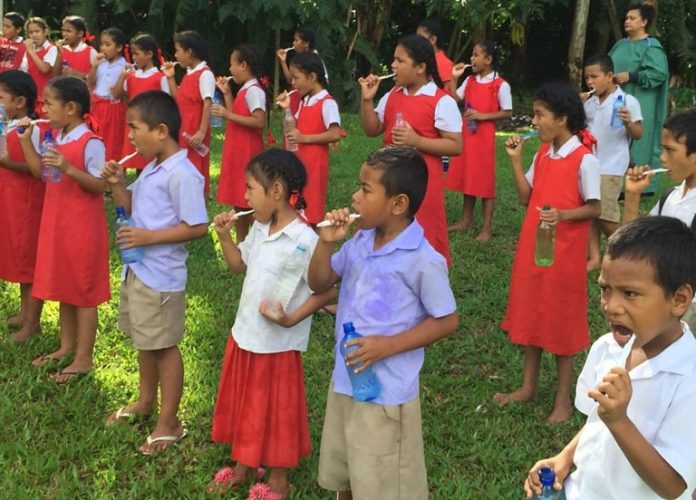In Pacific island countries and areas, as many as 1 in 2 children have dental caries in their baby teeth – the highest prevalence worldwide. When caries are left untreated, they can cause pain, making it uncomfortable for children to eat, speak and play.
Poor oral health can also lead to gum disease and tooth loss later in life, further reducing people’s health and quality of life.
Beyond the Pacific, poor oral health is also a challenge. Throughout the World Health Organisation (WHO) Western Pacific Region, more than 800 million individuals – 42 percent of people – suffer from dental caries, severe gum disease, tooth loss or oral cancers. The rate of oral health disease in the Region has grown by 30 percent over the past three decades, and it disproportionally affects poor and disadvantaged populations.
Although most oral diseases are preventable and can be treated in the early stages, high out-of-pocket expenses for oral health care make it unaffordable for many families. Oral health care is usually not included in most national universal health coverage (UHC) packages. However, WHO Member States adopted a historic resolution historic resolution on oral health oral health in 2021 that calls on countries to include oral health prevention and treatment as part of UHC, and countries and areas in the Pacific are making efforts to ensure healthy smiles for all.
“Having good oral health enhances overall health and well-being in every phase of life,” says Dr Saia Ma’u Piukala, WHO Regional Director for the Western Pacific. “By integrating oral health into primary health care, we can achieve cost efficiencies and bring down high rates of noncommunicable diseases, paving the way for better overall health outcomes in the Western Pacific.”
Suva Declaration on Improving Oral Health in the Pacific Islands Region
In 2014, seven years before the global resolution on oral health was adopted, heads of dental services from 14 Pacific island countries and areas adopted the Suva Declaration on Improving Oral Health in the Pacific Islands Region and established the Oral Health Pacific Islands Alliance (OPIA). The Suva Declaration provides recommendations on strengthening prevention and control of oral diseases, including strengthening the oral health workforce and provision of care.
Last year, OPIA reissued a call for accelerating actions on the Suva Declaration, and Dr Kantara Tim, President of OPIA, affirmed the body’s commitment to promote its implementation throughout the Pacific. Vanuatu is currently preparing to launch a revised national oral health policy based on WHO’s Global Oral Health Action Plan (2023–2030), and Nauru and Papua New Guinea are also working on developing national oral health policies.
“Gudfala Tut Skul” (Healthy Tooth School) – Vanuatu
Vanuatu has been strengthening its oral health promotion activities, including through its health promoting schools programme. Since 2019, the Gudfala Tut Skul programme, which was launched by the Ministry of Health of Vanuatu in collaboration with WHO and other local partners, has strengthened oral health promotion in the country’s schools by increasing access to affordable fluoride toothpaste and emphasizing good nutrition, such as reducing intake of sweets, biscuits and sugary drinks. This helps to promote not only good oral health, but also overall well-being.
“The Gudfala Tut Skul Programme takes advantage of the fact that young children are more open to learning and adopting new behaviours. By educating them on proper toothbrushing and good nutrition, we can help ensure a healthier future for generations to come,” says Dr Jenny Stephens, Acting Director, Department of Public Health, Ministry of Health, Vanuatu.
“Mali Mali” (Smile) – Tonga
In Tonga, the South Pacific Medical Team (SPMT), a voluntary group of Japanese dentists, has been working with the Tongan Ministry of Health and Ministry of Education, as well as the Japanese International Cooperation Agency, to improve children’s oral health through a programme called “Mali Mali” – or “smile” in Tongan. Once per week, SPMT visits schools throughout the country to guide teachers on teaching children how to brush their teeth and use fluoride-containing mouth rinses. Schoolchildren now brush their teeth at school every day after lunch, supervised by their teachers.
The Mali Mali programme is implemented in all kindergartens and primary schools in Tonga, and it has helped the country achieve a dramatic decrease in dental caries among children aged 12 and under. It received a Best Practice Award as part of the Healthy Islands Recognition during the Fifteenth Pacific Health Ministers Meeting in 2023.
Global Oral Health Action Plan: Implications for the Pacific
WHO’s Global Oral Health Action Plan (2023−2030) promotes preventive measures, early detection and timely treatment of oral diseases. By focusing on making oral health part of UHC, the action plan aims to ensure that everyone has access to good-quality oral health-care services without incurring financial hardship. The action plan also emphasises the importance of integrating oral health into primary health care systems in order to improve access to oral health-care services, particularly for vulnerable populations.
“Let’s recognise the progress made in oral health care in the Pacific and renew our commitment to the Global Oral Health Action Plan so everyone can get the oral health care they need,” says Dr Saia Ma’u Piukala. “Everyone has the right to a healthy smile.”


















